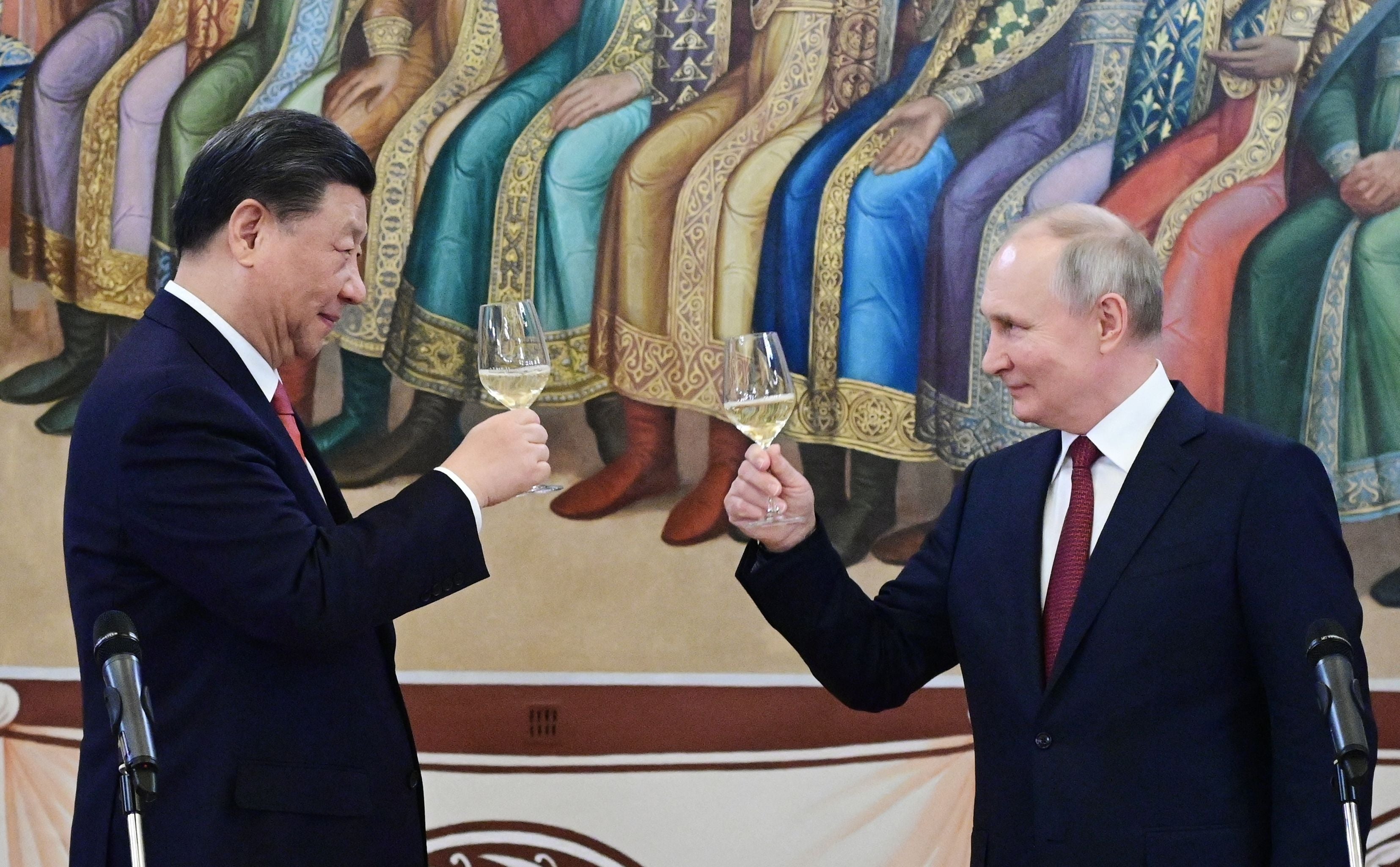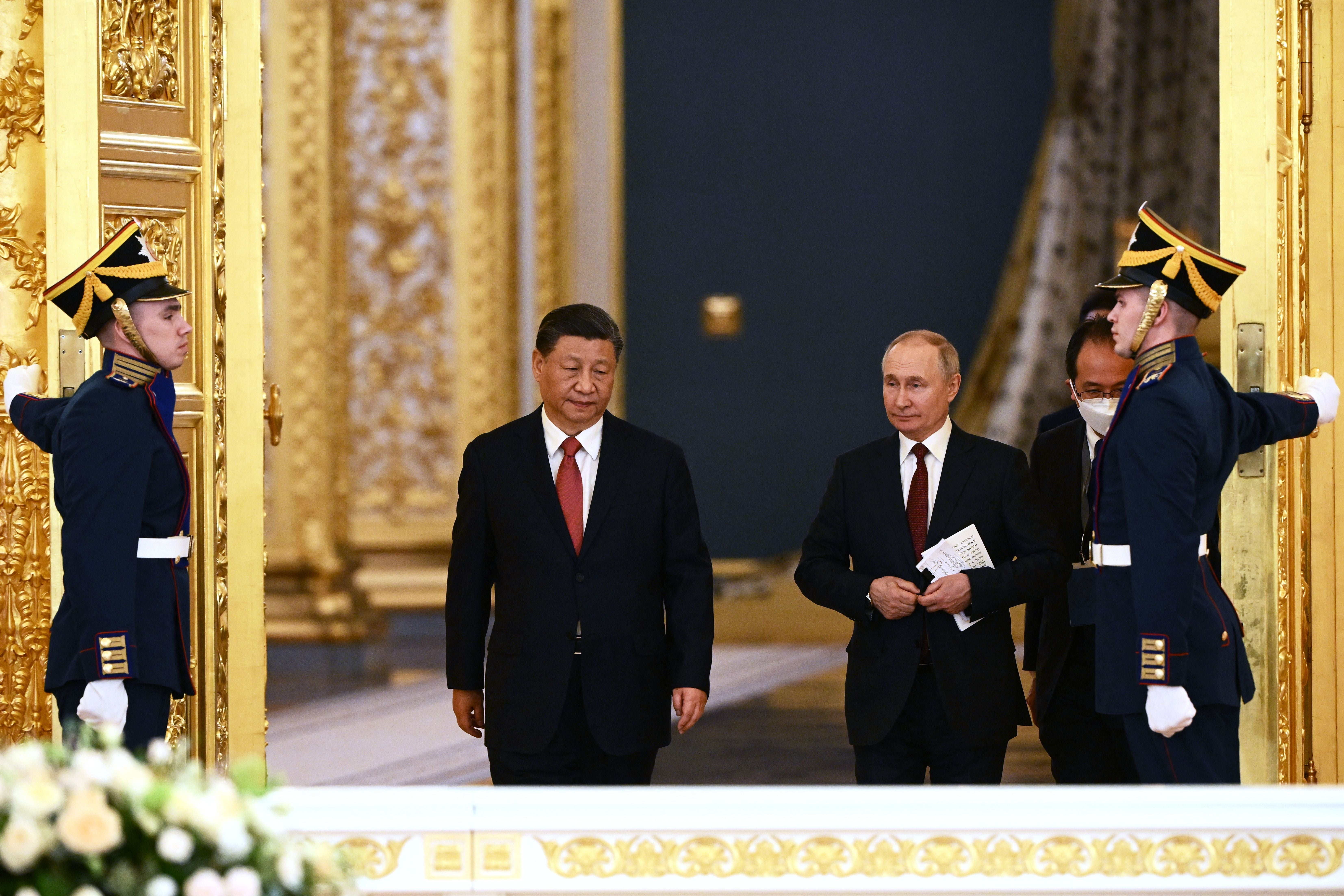Vladimir Putin arrives in China to meet Xi Jinping as West watches with growing concern
Russian president seeks to deepen pivotal relationship as West pressures Beijing to cut support to Moscow’s defence industry
Your support helps us to tell the story
From reproductive rights to climate change to Big Tech, The Independent is on the ground when the story is developing. Whether it's investigating the financials of Elon Musk's pro-Trump PAC or producing our latest documentary, 'The A Word', which shines a light on the American women fighting for reproductive rights, we know how important it is to parse out the facts from the messaging.
At such a critical moment in US history, we need reporters on the ground. Your donation allows us to keep sending journalists to speak to both sides of the story.
The Independent is trusted by Americans across the entire political spectrum. And unlike many other quality news outlets, we choose not to lock Americans out of our reporting and analysis with paywalls. We believe quality journalism should be available to everyone, paid for by those who can afford it.
Your support makes all the difference.China has rolled out the red carpet to welcome Russian president Vladimir Putin for a potentially consequential and heavily symbolic state visit that will be closely watched in the West.
Mr Putin’s second visit in less than a year comes as Western nations, led by the US, are putting pressure on China to stop throwing its economic and industrial weight behind Russia’s war in Ukraine.
The two-day trip is Mr Putin’s first abroad since starting his new term as president earlier this month.
Mr Putin arrived in Beijing on Thursday morning to a grand fanfare, with a red carpet reception outside the Great Hall of the People where a marching band played the Red Army Choir classic Moscow Nights. There he was greeted by Chinese president Xi Jinping, and the two shook hands for the cameras before doing laps of the grounds.
Mr Putin is meeting Mr Xi for the fourth time since the start of the Ukraine war in February 2022, and has been billed as marking the 75th anniversary of the establishment of diplomatic relations between their countries.
Mr Xi told Mr Putin he was prepared “to consolidate the friendship between the two peoples for generations to come”.
“In the new journey ahead, China is willing to always be Russia’s trustworthy good neighbour, good friend and good partner, strengthening generation-after-generation friendship between the two peoples and jointly achieving rejuvenation of their respective countries as well as upholding justice in the world,” he said.
He also congratulated his “old friend” Mr Putin for winning a fifth term as president that will keep him in power until at least 2030.
Mr Putin and Mr Xi are set to discuss ways to strengthen their “no limits” partnership which was announced at a previous meeting between them nearly two years ago.
The West has been testing this partnership by pressuring China to end economic and industrial support that has enabled Russia to blunt the impact of American and European sanctions cutting it off from global markets and supply chains.
China’s bilateral trade with Russia soared by 26 per cent to a record $240bn last year.
Analysts told The Independent that Beijing and Moscow will try to find ways to expand bilateral trade and sidestep Western sanctions.
“The Putin-Xi meeting is both consequential and symbolic as they will definitely seek to strengthen their partnership in the face of enormous fatigue and reluctance to support the war in Ukraine among Western leaders,” said Swaran Singh, an international relations expert and professor of diplomacy at New Delhi’s Jawaharlal Nehru University.

For Mr Putin, the visit is a chance to show off his alliance with the world’s second largest economy and signal that he still has powerful friends, despite being otherwise largely isolated on the global stage.
“Putin’s visit to Beijing, which is usually full of pomp and show, will be a good opportunity of portraying himself as an acceptable leader while seeking endorsement from Xi for his actions in Ukraine,” Mr Singh said.
On the eve of his visit, Mr Putin hailed the Chinese leadership’s understanding of the “root causes and global geopolitical significance” of the Ukraine war and welcomed Beijing’s peace plan to end the conflict.
“We are seeking a comprehensive, sustainable and just settlement of this conflict through peaceful means,” he told the Chinese news agency Xinhua. “We are open to a dialogue on Ukraine, but such negotiations must take into account the interests of all countries involved in the conflict, including ours.”
Mr Putin added that they plan to have “closer cooperation in industry and high-tech, outer space and peaceful atom, artificial intelligence, renewable energy and other innovative sectors”.

“Putin’s visit to Beijing, which includes a delegation of Russian cabinet members and the heads of state-owned banks and energy corporations, shows the Russia-China ‘comprehensive partnership of strategic coordination for a new era’ continues to move forward with full force,” said Dr Jonathan Ward, a senior fellow at the Hudson Institute in Washington DC and author of The Decisive Decade.
Dr Ward noted that with Chinese support for Russia in Europe and Russian support for China on Taiwan, “there may be much more dangerous activity to come in the years ahead as these two authoritarian states continue to deepen their relationship”.

Washington has claimed that Beijing is aiding Russia’s war in Ukraine by providing satellite intelligence, parts for fighter jets, microchips and other equipment while filling Moscow’s war chest with record oil imports. For this, the US has sanctioned several Chinese companies and threatened to blacklist Chinese banking institutions unless they suspend business with Russian companies.
China has not directly sold arms to Russia since the Ukraine war began, but has exported so-called “dual-use” components that can be used in weapons manufacturing as well as to non-military ends. Beijing claims it is neutral in the Ukraine conflict and insists it hasn’t broken US sanctions over the war.
But Beijing’s tactical backing of Moscow has also angered the European Union, with questions over Ukraine overshadowing a recent trip to France by Mr Xi that was supposed to serve as a charm offensive. Mr Xi, during his first visit to Europe in five years, insisted that “China is neither the creator of the crisis, nor a party to it or a participant”.
“I don’t think China will significantly increase its support to Russia that may lead to Russia having a much stronger war-fighting capability. Very likely, China will continue to argue its commercial transactions with Russia are normal international trade and attempt to maintain roughly the same level of trade relations with Russia,” Li Mingjiang, an associate professor at Singapore’s Rajaratnam School of International Studies, told The Independent.
“Now that the US and European countries are exerting quite strong pressures on China’s export of dual-use technologies and equipment to Russia, Putin may seek commitment from the Chinese leader that China will not waver under Western pressures.”
While Mr Putin is likely to seek further support from Beijing as it gains ground in Ukraine, Mr Xi needs Moscow to counterbalance the US.
America’s support for Taiwan – which it formally acknowledges is a part of China but says it will support against any attempt at forceful occupation by mainland forces – its naval presence in the South China Sea, repeated threats of sanctions and escalating trade war have greatly damaged relations with the Asian superpower.
In this context, Mr Singh said, the Chinese president will not fundamentally change his approach to showing support for Russia.
Dr Ward underlined the need for the West to realise that this is a “combined adversary” that is here to stay.
“China has thrown its full economic weight behind Putin’s war, enabling him to rapidly reconstitute his military industrial base despite significant Western sanctions,” he said, arguing that this “means we must move forward with a larger spectrum of sanctions on China’s industries and companies that are linked to Putin’s war”.

Join our commenting forum
Join thought-provoking conversations, follow other Independent readers and see their replies
Comments